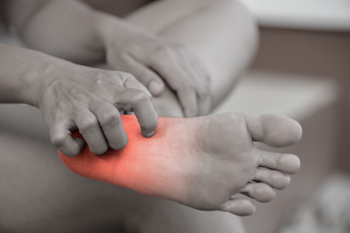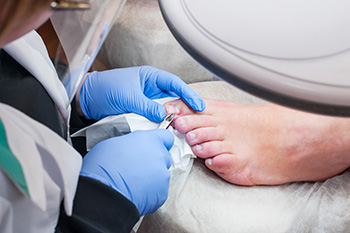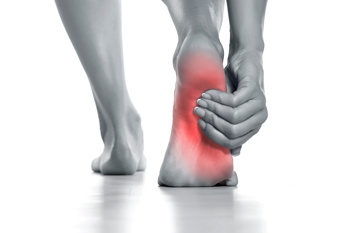

Peripheral neuropathy is a condition that affects the nerves in the feet, toes, and ankles, leading to symptoms such as burning, tingling, numbness, and pain. These symptoms can make it difficult to feel injuries or changes in temperature, which increases the risk of developing blisters, sores, and infections. Over time, untreated infections may lead to serious complications, including changes in foot structure or, in severe cases, the loss of a toe or foot. People with peripheral neuropathy may also experience muscle weakness and balance problems, making them more prone to falls. A podiatrist plays a key role in managing peripheral neuropathy by performing detailed exams to assess nerve function and blood flow in the feet. Monofilament exams and tuning fork evaluations can help determine the extent of nerve damage. A podiatrist can also provide guidance on proper foot care, early treatment for injuries, and strategies to prevent complications. If you have symptoms of peripheral neuropathy that affect your feet, it is suggested that you make an appointment with a podiatrist for an exam and treatment options.
Neuropathy
Neuropathy can be a potentially serious condition, especially if it is left undiagnosed. If you have any concerns that you may be experiencing nerve loss in your feet, consult with Dr. Edward D. Hutson from Easton, PA. . Our doctor will assess your condition and provide you with quality foot and ankle treatment for neuropathy.
What Is Neuropathy?
Neuropathy is a condition that leads to damage to the nerves in the body. Peripheral neuropathy, or neuropathy that affects your peripheral nervous system, usually occurs in the feet. Neuropathy can be triggered by a number of different causes. Such causes include diabetes, infections, cancers, disorders, and toxic substances.
Symptoms of Neuropathy Include:
Those with diabetes are at serious risk due to being unable to feel an ulcer on their feet. Diabetics usually also suffer from poor blood circulation. This can lead to the wound not healing, infections occurring, and the limb may have to be amputated.
Treatment
To treat neuropathy in the foot, podiatrists will first diagnose the cause of the neuropathy. Figuring out the underlying cause of the neuropathy will allow the podiatrist to prescribe the best treatment, whether it be caused by diabetes, toxic substance exposure, infection, etc. If the nerve has not died, then it’s possible that sensation may be able to return to the foot.
Pain medication may be issued for pain. Electrical nerve stimulation can be used to stimulate nerves. If the neuropathy is caused from pressure on the nerves, then surgery may be necessary.
If you have any questions, please feel free to contact our offices located in Easton, and Northampton, PA . We offer the newest diagnostic and treatment technologies for all your foot care needs.

An ingrown toenail occurs when the edge of a toenail grows into the surrounding skin causing pain, redness, swelling, and sometimes infection. This condition is most common on the big toe and can occur from improper nail trimming, wearing tight shoes, or injury to the toe. When conservative treatments such as soaking, proper nail care, and antibiotics for infection do not provide relief, ingrown toenail surgery may be necessary. A podiatrist numbs the toe with a local anesthetic during the procedure to ensure comfort. This is followed by carefully removing the portion of the nail that is growing into the skin. In more severe cases, part of the nail bed may also be removed to prevent the nail from growing back into the skin. The area is cleaned and a dressing is applied. With proper care and hygiene, recovery typically takes a few weeks to ensure a successful healing process. If you have an ingrown toenail, it is suggested that you contact a podiatrist who can provide the best treatment solutions which may include surgery.
Ingrown toenails may initially present themselves as a minor discomfort, but they may progress into an infection in the skin without proper treatment. For more information about ingrown toenails, contact Dr. Edward D. Hutson of Easton, PA. . Our doctor can provide the care you need to keep you pain-free and on your feet.
Ingrown Toenails
Ingrown toenails are caused when the corner or side of a toenail grows into the soft flesh surrounding it. They often result in redness, swelling, pain, and in some cases, infection. This condition typically affects the big toe and may recur if it is not treated properly.
Causes
You are more likely to develop an ingrown toenail if you are obese, have diabetes, arthritis, or have any fungal infection in your nails. Additionally, people who have foot or toe deformities are at a higher risk of developing an ingrown toenail.
Symptoms
Some symptoms of ingrown toenails are redness, swelling, and pain. In rare cases, there may be a yellowish drainage coming from the nail.
Treatment
Ignoring an ingrown toenail can have serious complications. Infections of the nail border can progress to a deeper soft-tissue infection, which can then turn into a bone infection. You should always speak with your podiatrist if you suspect you have an ingrown toenail, especially if you have diabetes or poor circulation.
If you have any questions, please feel free to contact our offices located in Easton, and Northampton, PA . We offer the newest diagnostic and treatment technologies for all your foot care needs.

Standing on your feet all day can lead to foot pain, swelling, fatigue, and even more serious issues like plantar fasciitis, bunions, or varicose veins. Prolonged standing increases pressure on the feet causing discomfort and reducing circulation, which may result in aching muscles or stiffness. Over time it can also contribute to joint and ligament strain, impacting posture and overall health. To counteract these effects, wear supportive footwear with proper cushioning and arch support. Take short breaks to sit or stretch your legs whenever possible. Consider using anti-fatigue mats if standing in one spot for extended periods. Regularly stretching your calves, ankles, and feet can improve circulation and alleviate tension. If pain persists, it is suggested that you visit a podiatrist who can assess your feet, recommend orthotics or treatments, and help prevent long-term damage to your feet and overall health.
While working on the feet, it is important to take the proper care of them. For more information about working on your feet, contact Dr. Edward D. Hutson from Easton, PA. . Our doctor will treat your foot and ankle needs.
Working on Your Feet
Standing on your feet for long periods of time can cause stress and pain in your feet. Your whole body may experience change in terms of posture, back pain, bunions, callouses and or plantar warts. There are ways to avoid these conditions with proper foot care, smart choices and correct posture.
Positive Changes
Negative heeled shoe – Choosing this shoe type places the heel slightly lower than the ball of the foot. These are great for overall foot health. Find shoes that fit you correctly.
Go barefoot – Our feet were not designed to be enclosed for all hours of the day. Try to periodically expose your feet to air.
Eliminate Pain
Foot Exercises – Performing simple exercises, incorporating yoga and doing stretches are beneficial. This will allow increased blood flow to the area and muscles of the foot.
Achilles tendon – Stretching the foot out flat on the floor will relax the calf muscles and tendon. These exercises can be performed almost anywhere. Make sure you add these exercises to your daily regimen.
With a little bit of this information and knowing more about foot health, you will notice changes. Foot stretches and proper footwear will help with pain and prevent further issues.
If you have any questions please feel free to contact our offices located in Easton, and Northampton, PA . We offer the newest diagnostic and treatment technologies for all your foot and ankle needs.

Burning feet syndrome, or BFS, is also known as Grierson-Gopalan. It refers to a sensation of burning or heat in the feet, often accompanied by pain, tingling, or numbness. Symptoms may range from mild to severe, typically worsening at night. BFS can result from a variety of underlying causes, including nerve damage, neuropathy, diabetes, vitamin deficiencies, or chronic alcohol use. It is also associated with conditions like hypothyroidism or infections and can occur due to excessive pressure on the feet. While it can affect anyone, middle-aged and older adults are more commonly impacted. Diagnosis involves identifying underlying causes through blood tests, nerve conduction studies, and a physical exam. Treatment varies depending on the cause, including managing diabetes, supplementing deficiencies, or wearing supportive footwear. If you have persistent burning feet, it is suggested that you consult a podiatrist for expert evaluation and tailored care to alleviate discomfort.
Foot Pain
Foot pain can be extremely painful and debilitating. If you have a foot pain, consult with Dr. Edward D. Hutson from Easton, PA. . Our doctor will assess your condition and provide you with quality foot and ankle treatment.
Causes
Foot pain is a very broad condition that could be caused by one or more ailments. The most common include:
Diagnosis
To figure out the cause of foot pain, podiatrists utilize several different methods. This can range from simple visual inspections and sensation tests to X-rays and MRI scans. Prior medical history, family medical history, and any recent physical traumatic events will all be taken into consideration for a proper diagnosis.
Treatment
Treatment depends upon the cause of the foot pain. Whether it is resting, staying off the foot, or having surgery; podiatrists have a number of treatment options available for foot pain.
If you have any questions, please feel free to contact our offices located in Easton, and Northampton, PA . We offer the newest diagnostic and treatment technologies for all your foot care needs.